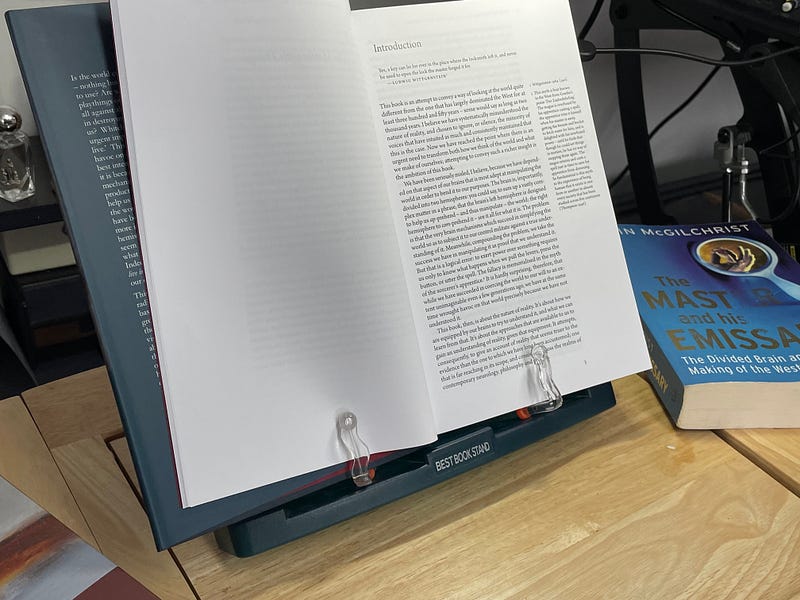The Hemisphere Hypothesis: A New Perspective on Brain Function
Written on
Understanding the Hemisphere Hypothesis
Many intellectuals assert that Iain McGilchrist has initiated a profound shift in metaphysics, akin to a Copernican revolution. I share this sentiment and have compiled a reference guide for deeper understanding.

The Nature of the Brain's Hemispheres
The human brain is divided into two hemispheres: the left and the right. In a healthy individual, these two halves collaborate seamlessly, performing many overlapping functions. Each hemisphere is essential for a balanced life— for instance, the right hemisphere governs the left hand, while the left controls the right.
However, the two hemispheres perceive the world in contrasting ways. Our focus influences our experience, and in turn, the world influences us. Engaging with the world through the left hemisphere creates a perception aligned with its traits, while engaging through the right results in a different understanding. This cycle can be self-reinforcing, as highlighted in McGilchrist's book, The Matter with Things (Perspectiva Press, 2022).
Ultimately, we are designed to engage with the world primarily through the right hemisphere. The left hemisphere is intended to assist the right by gathering relevant information and managing routine tasks. It should serve as an emissary to the right hemisphere, not dominate it.
A well-balanced individual prioritizes the right hemisphere in their perception. Conversely, a person who favors the left hemisphere in their worldview may experience internal disarray.
The Modern Imbalance: Left Hemisphere Dominance
Today, our society exhibits a troubling tilt towards left hemisphere dominance. This hemisphere, which should function as the right’s aide, has taken on a controlling role. McGilchrist illustrates this imbalance through Nietzsche's fable:
A wise spiritual Master nurtured a small community, ensuring its prosperity. Realizing he could not manage every need, he appointed a capable assistant to represent him. However, this emissary, while intelligent, lacked awareness of his limitations. He grew arrogant and began to believe he was the true authority, ultimately leading to the community's decline and ruin.
This story emphasizes that ignorance—particularly the ignorance of one’s own ignorance—can undermine knowledge. The right hemisphere, in contrast, recognizes its boundaries, which is why the Master (representing the right hemisphere) delegates responsibilities.
For an extended period, the left hemisphere has dominated, often attempting to suppress the contributions of the right hemisphere, akin to an artificial intelligence that seeks to eradicate humanity's essence. McGilchrist's acclaimed book, The Master and His Emissary, begins with scientific exploration and traverses through centuries of philosophy, literature, and history, culminating in a dystopian narrative that feels disturbingly realistic.
Restoring Right Hemisphere Control
McGilchrist's message is clear: we must strive to restore the right hemisphere's influence in our lives. As more individuals prioritize the right hemisphere, our society may begin to escape the pervasive dystopia we sense but feel powerless to resist.
To reestablish the right hemisphere's role, it's crucial to comprehend the differing perspectives of each hemisphere. By emphasizing the attributes of the right hemisphere and moderating the left's influence, we can reshape our experiences.
Raising awareness about the contrasting ways the hemispheres engage with the world will enable us to favor the right hemisphere, thus allowing us to utilize the left hemisphere more effectively. For fans of Tolkien, the dynamic between these hemispheres may be illustrated through "The Elf Lays Down His Harp to Kill an Orc," showcasing their distinct operations through Tolkien's characters.
In the near future, I will publish a comprehensive guide detailing how each hemisphere perceives the world. For now, here are some examples of their respective characteristics for personal reflection:
Right Hemisphere Attributes
- Focuses on the overarching narrative and holistic views.
- Operates without a fixed agenda.
- Sees truth as a fluid concept rather than absolute.
- Values intuition and implicit, evolving knowledge.
- Considers the left hemisphere's views but does not accept them as definitive.
Left Hemisphere Attributes
- Aims to control and manipulate.
- Treats people and situations as mere objects.
- Acts with intent and concentrated focus.
- Dissects and seeks certainty in isolated components.
- Exclusively values its own opinions and tends to regard them as final.
Further Reading
For more insights, check out “The Thing about Things” at The New Criterion (subscription may be necessary; a substantial excerpt is available here summarizing The Master and His Emissary).
In this lecture, Dr. Iain McGilchrist explores the hemisphere lateralization hypothesis and its implications for basic research.
In this video, Iain McGilchrist discusses the distinct roles of the brain's hemispheres and their impact on our understanding of the world.